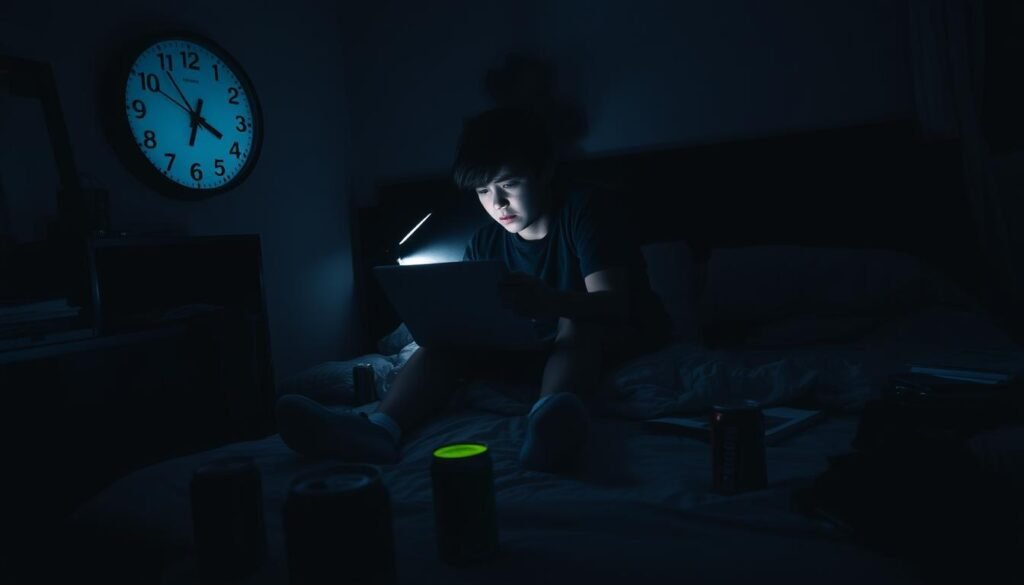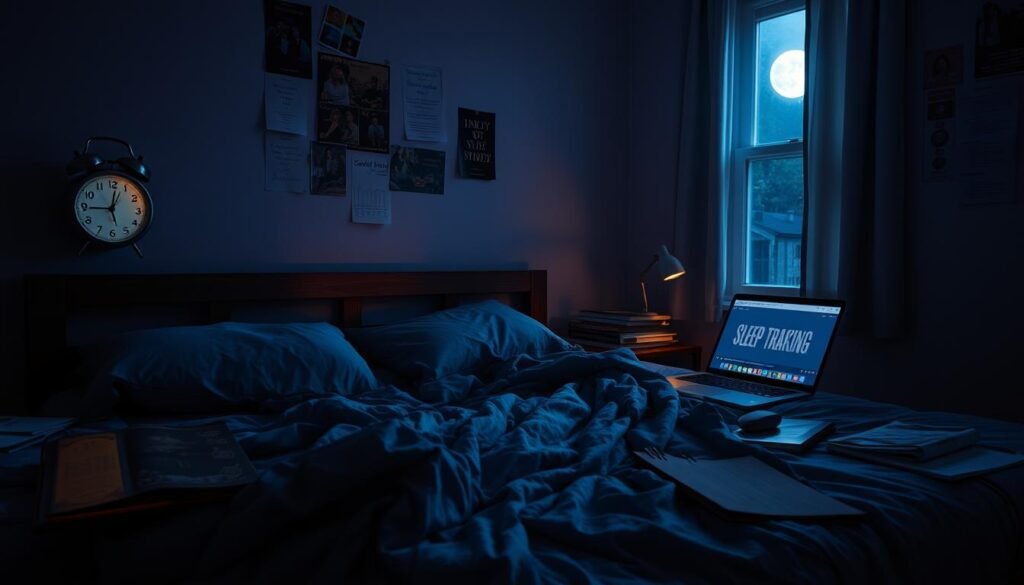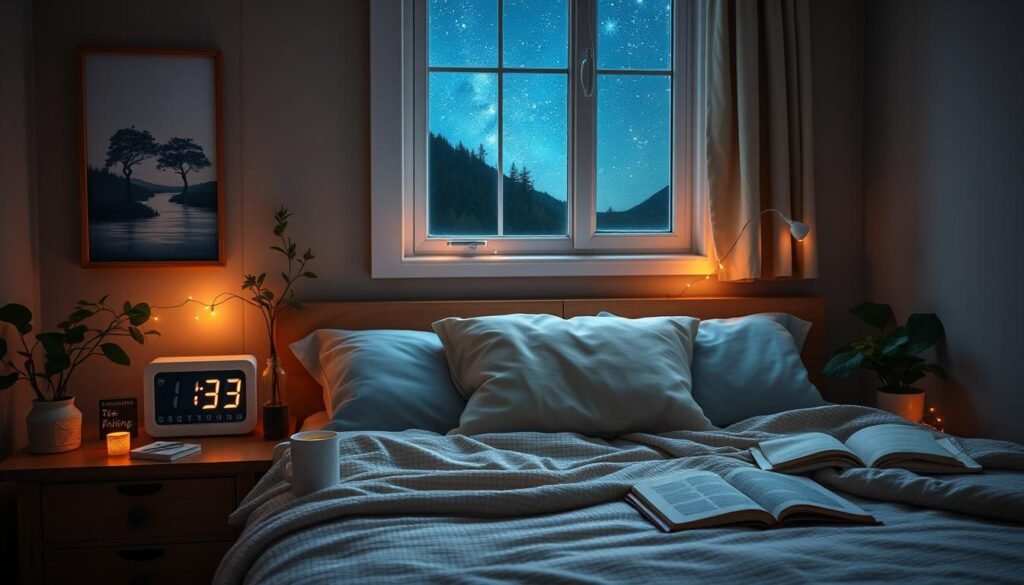Did you know that about 60% of teenagers get only 6 to 7 hours of sleep each night? That’s much less than the advised 8 to 10 hours. This shortfall is causing more cases of teen insomnia and related issues. Teens face a lot from school work, hanging out, to always being online. This puts many at risk of sleep problems, which can impact their health.
Not getting enough sleep does more than make teens tired. It can lead to mood changes, emotional trouble, and a higher chance of accidents because they’re not as sharp. Knowing why teens can’t sleep and what it does to them is key. We need to find natural ways to help. Since teens’ sleep patterns change in puberty, it’s important to address sleep issues early.
Key Takeaways
- Most teenagers need 8 to 10 hours of sleep to function optimally.
- Lack of sleep can lead to emotional issues such as moodiness and depression.
- Inadequate rest increases the risk of car accidents among driving teens.
- Bright lights from devices delay melatonin production, complicating sleep.
- Establishing regular sleep schedules can enhance sleep quality.
- Peer pressure often leads adolescents to prioritize activities over sleep.
Understanding Teen Insomnia
Many teens struggle to get enough sleep at night. This can make daily life hard for them. Changes in sleep patterns because of puberty cause trouble. Teens often feel like staying up late because of shifts in their internal clocks.
Not dealing with insomnia can lead to health issues. These include high blood pressure, depression, and a weak immune system. Teens with insomnia find it hard to fall and stay asleep. Anxiety, depression, asthma, and allergies are common causes. ADHD and autism can also make insomnia worse.
Too much screen time, caffeine, and messed-up sleep schedules make insomnia more likely. To diagnose insomnia, doctors look at sleep habits and may ask for a sleep journal or study. Treating teen insomnia often starts with fixing health issues or therapy for anxiety or depression. Cognitive behavioral therapy (CBT) is a common approach.
Doctors seldom give sleep meds to teens due to safety concerns. To better sleep hygiene, teens should have a regular bedtime, avoid bright lights, and keep a sleep schedule. It’s important to seek medical advice for ongoing sleep issues or if a teen is always tired during the day.
Signs of Insomnia in Teens
It’s important to know the signs of insomnia in teens for their health. As many as 39% of young people might have insomnia. This condition can interfere with their sleep at night and how they function during the day. It’s key for parents and caregivers to watch for these signs closely.
Common Symptoms to Watch For
Teens may show different signs that they’re not getting enough sleep. These signs include:
- Difficulty falling asleep, taking longer to fall asleep than normal.
- Frequent awakenings during the night, hurting the quality of sleep.
- Waking too early and not being able to go back to sleep.
- Daytime drowsiness, which leads to feeling very tired.
- Irritability and changes in mood, affecting how they get along with others.
- Difficulty concentrating, especially at school.
Daytime Effects of Poor Sleep
Sleep problems can cause big issues during the day for teenagers. Lack of sleep can hurt their grades, making it hard to focus and causing more mistakes. Poor sleep can also make them feel more upset or anxious. This may cause them to:
- Engage in risky behavior, which can lead to danger.
- Feel bad about themselves because they struggle with daily tasks.
- Harm their physical health, which can affect their long-term well-being.
Causes of Teen Insomnia
It’s key to know why teens have sleep issues. Many factors play a role, especially as they go through big life changes.
Circadian Rhythm Changes
When teens hit puberty, their circadian rhythms shift. They feel more awake at night and find waking up hard. This happens because their bodies release the sleep hormone, melatonin, later.
This messes with their sleep, making it hard for them to fall asleep at a good time.
Stress and Anxiety Factors
Teens face a lot of stress and anxiety. School, friends, and family expectations can make this worse. Worrying about grades or friendships keeps their minds running, making sleep tough.
About one in four teens struggle with sleep due to these pressures. It’s crucial to address this to help them sleep better.
Influence of Technology
Technology’s effect on sleep is huge. Teens spend lots of time on gadgets, which gives off blue light. This blue light stops melatonin from being produced right, throwing off their sleep timing.
Social media and gaming at night can make their sleep schedule inconsistent. This causes sleep problems for many teens.
| Factor | Impact on Sleep |
|---|---|
| Circadian Rhythm Changes | Delayed melatonin release; alert at night |
| Stress and Anxiety | Active mind; difficulty falling asleep |
| Technology Use | Blue light exposure; irregular sleep patterns |
Tackling teenage insomnia by encouraging good sleep habits can greatly improve their rest. This supports both their body and mind.
Teen Insomnia: Medical Conditions to Consider
It’s essential to know how sleep issues and medical problems are connected in teens. Many health issues can deeply affect a teen’s sleep. These issues can make insomnia worse and reduce an adolescent’s quality of life.
Obstructive Sleep Apnea
Obstructive sleep apnea (OSA) severely affects teenagers’ sleep. It causes interrupted breathing, leading to fatigue and concentration problems. Obesity often links to OSA, risking school performance. Addressing obesity may improve sleep quality.
Restless Legs Syndrome
Teens with restless legs syndrome feel they must move their legs due to discomfort. This makes sleeping hard. The result is being tired during the day, which can harm school work and friendships.
Impact of Mental Health Disorders
Mental health plays a big role in teens’ sleep. Conditions like anxiety and depression worsen insomnia. Many teens don’t see the connection between their feelings and sleep. Treating mental health is key for better sleep and health.
The Role of Environment in Sleep Quality
For teenagers fighting insomnia, creating a calm sleep space is key. The place you sleep in greatly impacts your ability to rest well. To get good sleep, one’s bedroom should meet their personal needs. This helps them nod off faster and stay asleep. Several things play into how good that sleep is.
Creating a Comfortable Sleep Setting
A few things are critical when making a cozy place to sleep:
- Room Temperature: A cooler room leads to better sleep.
- Lighting: Keeping it dark tells your brain it’s bedtime. Blackout curtains are a good idea.
- Bedding: Comfy mattresses and pillows are key to good sleep.
- Declutter: A clean room helps keep your mind at ease.
By making these changes, teens can make a space that’s perfect for sleep. This means fewer distractions and better rest at night.
Minimizing Disruptive Noises
Sounds from outside can interrupt sleep. Common noises come from:
- Traffic
- People in your house
- Noises from brothers or sisters
Using earplugs or a white noise machine can help. These small steps often make a big difference for teens with sleep issues.
Impact of Lifestyle Choices on Sleep
It’s important for teens to understand how lifestyle choices affect sleep quality. Factors like how much caffeine they drink and how active they are play a big part. Knowing this can help teens make choices that improve their sleep and overall health.
Caffeine and Diet Considerations
Caffeine is a big deal when it comes to teen sleep. Many teens drink sodas, coffee, and energy drinks, especially later in the day. These drinks can make it really hard for them to fall asleep at night. Eating big meals or snacking late at night also makes sleeping well harder.
Exercise and Activity Levels
Being active regularly helps teens sleep better. But, working out too late in the day can keep them awake. It’s best to spread physical activities out during the day. This helps teens sleep better at night.

| Factor | Positive Effects on Sleep | Negative Effects on Sleep |
|---|---|---|
| Caffeine Consumption | Awareness of timing & amounts | Delayed sleep onset, poor sleep quality |
| Dietary Choices | Light snacks or meals | Heavy meals before bed |
| Exercise | Increases sleep duration | Late-night vigorous workouts |
Natural Solutions for Managing Teen Insomnia
Finding ways to help teens with insomnia is essential. We can combine wellness activities and natural remedies. Setting up a bedtime routine helps create a peaceful environment. This makes it easier for the body to get ready for sleep.
Such routines can include sticking to a sleep schedule, trying relaxation methods, and watching what you eat before bed. These steps can make sleeping through the night easier.
Bedtime Routines and Relaxation Techniques
Having a fixed routine at bedtime can make a big difference in dealing with insomnia. Parents can suggest relaxation techniques like:
- Reading a book or listening to soothing music
- Taking a warm bath to signal the body to unwind
- Practicing meditation for improved mental calmness
Doing these activities regularly helps promote relaxation. It also teaches the body to know when it’s time for bed. This leads to better sleep routines.
Herbal Remedies and Supplements
There are many natural treatments for teen insomnia that can help with better sleep. Some good options are:
| Herbal Remedy | Benefits |
|---|---|
| Chamomile | Known for its calming effects, making it easier to fall asleep. |
| Melatonin | Can help regulate sleep cycles and improve overall sleep quality. |
| Lavender Oil | Promotes relaxation and has shown positive results for sleep in individuals with anxiety. |
| Ashwagandha | May improve REM sleep and reduce stress levels. |
| Valerian Root | Helps with falling asleep and staying asleep. |
It’s very important to talk to a healthcare professional before trying any new supplement or herb. This ensures they are a safe choice for managing insomnia in teens.
When to Seek Professional Help
It’s key to spot sleep disorder signs in teens for their health. Parents need to watch how their kids sleep. If trouble sleeping lasts over a few weeks, or if they’re always tired, seeing a doctor is crucial. A doctor can figure out the problem and how to fix it.
Recognizing Serious Sleep Disorders
Knowing what symptoms look out for helps in acting fast. Look for signs like:
- Frequent waking during the night
- Gasping for breath or heartburn that disrupts sleep
- Falling asleep during passive activities, such as watching TV
- Memory issues and difficulty concentrating
- Irritability or emotional volatility
These signs tell parents if they should dig deeper into the issue.
Consulting Sleep Specialists
Talking to a sleep expert is smart if a teen struggles with not sleeping well long-term. They do full checks and create custom plans to help. They deal with insomnia and what causes it.

Seeing a specialist early makes a big difference in sleep and health. Taking action early helps avoid bigger problems like weight gain, anxiety, or heart issues.
Preventing Teen Insomnia
Helping teens build good sleep habits is key during their teenage years. They’re dealing with school stress and social life. Working together, parents and teens can set up good sleep practices.
Building Healthy Sleep Habits
Good sleep is crucial for teens’ health. Simple steps can really help them sleep better:
- Limit screen time before bed to reduce exposure to blue light.
- Encourage relaxation techniques, such as reading or meditation, prior to sleep.
- Create a calm and comfortable sleep environment with suitable bedding and soothing scents.
- Engage in daily outdoor activities and exercise to promote better sleep.
- Monitor caffeine intake, especially during the late afternoon and evening hours.
Importance of Consistent Sleep Schedules
Sticking to a sleep schedule is very important for teens. Going to bed and waking up at the same time every day is good for their body clock. This helps avoid sleep problems and makes them more alert during the day.
However, late-night events and being too busy can mess with their sleep schedule. Finding a balance is important. Knowing how timing and routines affect sleep can really improve their health.
Educating Teens About Sleep Hygiene
It’s key to know how much sleep teens need for their well-being. Those aged 13 to 18 need 8 to 10 hours of good sleep each night. Yet, many don’t get enough. Surveys reveal that about 60% of middle schoolers and 70% of high schoolers in the US lack proper sleep on weekdays. Adding adolescent sleep education to school lessons could really help them understand why good sleep matters.
Understanding Sleep Needs
As teens grow, they need more sleep than before, around 9 to 9½ hours nightly. Not sleeping enough can cause big problems. For example, it can make them moody, hurt their grades, and lead to health issues like diabetes and heart disease. Talking about these issues can motivate teens to value their sleep more.
Discussing the Impacts of Sleep Deprivation
Talking about sleep problems helps teens see why sleep is so important. Teens not getting enough shut-eye often take more risks, like using drugs or alcohol. Also, it’s more common for female, Black, Asian, and multiracial teens to have sleep issues. Conversations with family and friends can promote better sleep habits. Parents have a big role in stressing sleep’s importance and pushing for healthy sleep routines. This guidance can safeguard their mental and physical health.

Parental Guidance in Managing Insomnia
Parents play a huge role in dealing with teen insomnia. They act as examples and their support means a lot. They can help by setting sleep-friendly routines. These routines make falling asleep easier, fighting insomnia.
How Parents Can Support Healthy Sleep
To foster a good sleep environment, parents have a job to do. They should:
- Establish consistent bedtime and wake-up schedules.
- Limit screen time in the evening, which may disturb the natural sleep cycle.
- Create a soothing bedtime routine that promotes relaxation.
- Educate their teens about the importance of sleep for overall health.
When parents back their teen’s sleep, kids feel they can make sleep a priority. This helps them handle the stress of school and social life without losing sleep.
Monitoring Sleep Patterns
It helps to watch how teens sleep. Parents can use sleep journals or apps for this. They should note:
- Bedtime and wake time
- Duration of sleep
- Frequency of awakenings during the night
This info gives a clear view of a teen’s sleep health. Spotting issues early can lead to talks with doctors for the right help. For more help, check out guides on managing teen insomnia.
Conclusion
Understanding how to manage teen insomnia is key to better sleep for young people. Many factors like anxiety, growth, and even a family’s money situation can affect how well teens sleep. A study with 313 teens from different schools showed many struggle with insomnia. This shows how important it is to find good sleep solutions.
Starting natural sleep aids and a regular bedtime can really help. Teens need about eight to ten hours of sleep for their health. Sleep problems can lead to anxiety and depression, so it’s urgent to find solutions. Parents can look at research linking sleep and mental health for help. For more info, check out the article on sleep issues here.
Teens face many challenges today, and good sleep is crucial for overcoming them. By spotting insomnia early and finding solutions, teens and parents can improve sleep. This leads to a happier and more refreshed future.